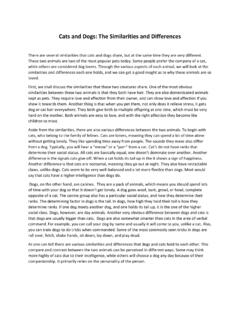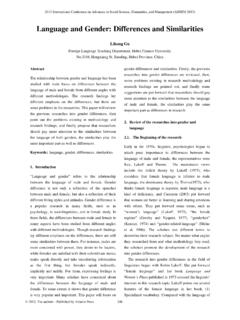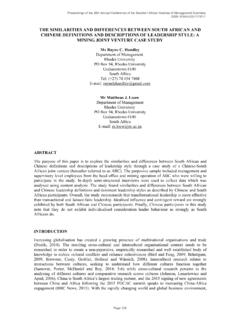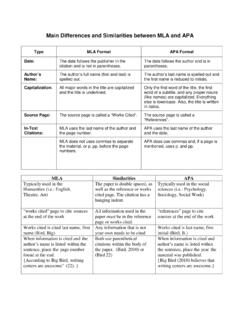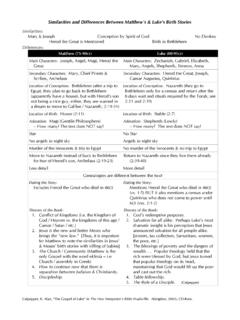Transcription of Similarities and Differences between Public Administration ...
1 International Journal of Scientific Engineering and Research (IJSER) ISSN (Online): 2347-3878, Impact Factor (2014): Volume 4 Issue 1, January 2016 Licensed Under Creative Commons Attribution CC BY Similarities and Differences between Public Administration and Business Administration Dr. S. B. M. Marume1, R. R. Jubenkanda2, C. W. Namusi3 1BA, Hons BA, MA MAdmin, MSoc Sc, PhD 2 BSc (Hons), MSc. Econ, MSc, DPhil (Candidate) 3 BAdmin (Hons), MPA, DPhil (Candidate) Faculty of Commerce and Law, Zimbabwe Open University Contact Details Email: Cell: +263 734 419 356 Abstract: It is recognized that Public Administration and Business Administration are both academic subjects and both deal with human behaviour. Although they share the use of certain auxiliary subjects as specialties or as tools, they have distinct fields of study and subject matter. The purpose of this article is to demonstrate the areas of Similarities or commonness, on the one hand, and, on the other hand and Differences between them.
2 Amongst the most significant difference between them is the milieu. Keywords: Similarities , Differences , factors and point of view. This article focuses on Public Administration as an academic subject and its relation as such to other university subjects, in particular Business Administration . An examination of this kind, if allowed to be pursued to its logical limits/conclusions, would become an examination of philosophical concepts such as the interrelatedness or interconnectedness of all things , unity of the universe and the special and general theories of relativity. It is not proposed to carry out this examination so far, but just to remember that Public Administration is not an independent world providing all the answers to humankind s problems and challenges. All that Public Administration can do is to make a contribution an important contribution; it is felt, in view of the omnipresence of its field in orderly human behaviour.
3 Since the activities in Public Administration are integrative and comprehensive, there must of necessity be a connection between the science of Public Administration and all other sciences whose fields are part of the field of human behaviour. We can, of course, expect a degree of relationship because sub-fields of certain subjects are more closely allied than the entire fields of the respective subjects. We, therefore, refer to subject groups such as natural and social sciences and, in the social sciences, to economic, commercial, administrative, and educational sub-groups. The activities of modern Public institutions have so wide a scope that all fields of study or knowledge are to a greater or lesser degree reflected and utilized in them. The administrator in the private as well as in the Public sector is constantly called upon to combine different specialized processes at different levels, with a view to the effective realization of the various aims of authorities, and we must, therefore, relate the subject Public Administration to other subjects.
4 Since its relation to any one subject has a structure more or less similar to its relations to others, we shall discuss its relation to Business Administration in particular. Administration and Business Administration Commonness and Similarities What the exponents of the scientific Administration approach called the content of Administration [POSDCORB, P = planning, O = organizing, S = staffing, D = directing, CO = coordinating, R = reporting, and B = budgeting, for example] is the common field of Public Administration and Business Administration . By this it has to be understood that by common it is not meant exactly the same. Yes, it is true that both subjects are concerned with such processes as: policy-making; organisation; planning; and control; both are called upon to test, recruit, appoint and promote personnel; both require financial resources. Certain methods of handling material are also common to both subjects, for instance, case studies, games theory, quantification, use of computers and so on.
5 Today, Public Administration and Business Administration have much to teach each other, though neither need dominate the other. Knowledge cannot be exchanged, however, except in the area of specific techniques (hardware), for example, work study (organisation and methods, time and motion), methods of enquiry with a view to the generation and collection of data, organisation and structuring. Both Public Administration and Business Administration utilize the same auxiliary (or intra-generic) subjects, such as planning, communications, operations research, mathematical and statistical methods, and the theory of probability. Paper ID: 2711150241 of 44 International Journal of Scientific Engineering and Research (IJSER) ISSN (Online): 2347-3878, Impact Factor (2014): Volume 4 Issue 1, January 2016 Licensed Under Creative Commons Attribution CC BY In fact, a group of administrative thinkers like Henry Fayol, Mary Parker Follett, Lyndall Urwick do not make a distinction between Public Administration and business Administration .
6 They maintain the view that all Administration , whether Public or business, is one and possess the same basic features. For example, Fayol says, The meaning which I have given to the word Administration and which has been generally adopted, broadens considerably the field of administrative science. It embraces not only the Public service, enterprises of every size and description, of every form and every purpose. All undertakings require planning, organisation, command, coordination and control, and in order to function properly, all must observe the same general principles. We are no longer confronted with several administrative sciences, but with one which can be applied equally well to Public and private affairs. Similarly, Urwick says, It is difficult to contemplate seriously a biochemistry of bankers, a physiology of professors, or a psychopathology of politicians.
7 The attempt to subdivide the study of management or Administration in accordance with the purpose of particular forms of undertaking seems to many authorities equally misdirected. The specific Similarities between Public and business (private) Administration are as below. (a) The managerial techniques and skills of planning, organizing, coordinating, controlling, and so on are same in both. (b) Both have uniformity in accounting, filing, statistics, stocking, and so on. (c) Both are organized on the basis of principle of hierarch, that is, scalar chain. (d) Both are being influenced by the practices and standards of each other. Thus, J. M. Pfiffner and Robert Presthus have described the emergence of Public corporation as a half way house between its commercial prototype and the traditional governmental department. (e) Both have Similarities so far as the problems of organisation, personnel and finance are concerned.
8 (f) The similarity between Public Administration and business Administration is demonstrated by the fact that there is a mutual exchange and rotation of personnel between the two disciplines. Peculiarities and Differences In respect of milieu, aims and values, there is a marked difference between Public Administration and Business Administration . By saying that in this connection ..familiarity may breed blindness, that is, what is meant by the term Business Administration here, is sometimes also loosely referred to as Business Economics or just Management; Dwight Waldo [1956: 131] means that the generic aspects of Administration are significant only in their specific institutional context; in other words, when they are oriented towards certain aims and values. Public Administration refers to the Administration which operates in the governmental setting Business (Private) Administration , on the other hand, refers to Administration which operates in the non-governmental setting, that is, business (private) enterprises.
9 Hence they are also known as governmental Administration and business Administration respectively. Differences as expounded by leading administrative scientists. Public Administration is different from private Administration in terms of the environment (that is, institutional setting) which it operates. Paul H. Appleby, Sir Josia Stamp, Herbert A. Simon and Peter Drucker, unlike H. Fayol, Follett, and L. Urwick, beautifully made a distinction between Public Administration and private Administration , as demonstrated below: Paul Appleby s view: According to him, Public Administration is different from private Administration in three aspects: a. Political character b. Breadth of scope, impact and consideration c. Public accountability. Josia Stamp s view: According to him, Public Administration differs from business Administration in four aspects a. Principle of uniformity b. Principle of external financial control c.
10 Principle of Public responsibility d. Principle of service motive. Herbert Simon s view: According to him, the distinction between Public Administration and private Administration lies in the popular imagination which relates to three points, as follows: a. Public Administration is bureaucratic, whereas private Administration is business-like. b. Public Administration is political, while private Administration is non-political. c. Public Administration is characterized by red-tape, while private Administration is free from it. Peter Drucker s view: According to him, Public Administration (service institution) is basically different from private Administration (business institution). To quote him, It is different in its purpose. It has different values. It needs different objectives. And it makes a different contribution to society. Performance and results are quite different in a service institution from what they are in a business institution.




